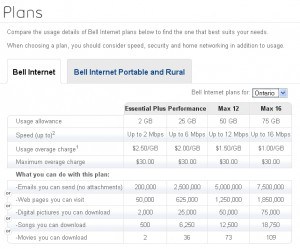
Mark A. Jamison
Stop the Cap! reader Joe sends along news of another one of those guest opinion hit pieces on Net Neutrality that pop up regularly in the media. This one, The Internet is Never Neutral, printed in today’s Sun-Sentinel in south Florida, comes from Mark A. Jamison and Janice Hauge, a dynamic duo who have co-written several papers that always manage to turn up favorable conclusions for big telecommunications companies, including these page-turners:
- “Bureaucrats as Entrepreneurs: Do Municipal Telecom Providers Hinder Private Entrepreneurs?”
- “Subsidies and Distorted Markets: Do Telecom Subsidies Affect Competition?”
- “Dumbing Down the Net: A Further Look at the Net Neutrality Debate.”
The two are also working on other papers purporting to study regulatory policy and competition issues. Let me illustrate my psychic powers by guessing they’ll find regulatory authorities to be obstacles to the well-oiled telecommunications machine and competition will be most hearty if there are no pesky regulations to hamper it. We’ve seen how well that has worked so far for consumers in North America.
Remember Al Gore calling the Internet the information superhighway? The metaphor wasn’t and isn’t perfect, but it is instructive. Suppose we applied net neutrality to our transportation system — there would be no high-occupancy vehicle lanes during rush hour, no car-only lanes on interstates, and no toll road as an alternative to I-95 in South Florida. Transportation would be more costly and provide less value.
Forcing net neutrality would have similar results. Time-sensitive information, such as stock market transactions, would wait in line behind football game highlights.
Jamison, who is a former manager at Sprint Communications, and Hauge miss the entire point of the Internet’s biggest strength: its equal treatment of traffic from the smallest blog to Amazon.com. Assuming providers, earning billions in profits even as their costs decline, invested appropriately in those networks, there would be no need for high-occupancy vehicle lanes and toll roads. These kinds of “traffic management” techniques are proposed because provider dollars don’t keep up with consumer demand. Social engineering tries to throttle traffic downwards by discouraging it with toll fees or manage it with special high cost lanes reserved only for those willing to pay or follow arbitrary rules governing their use. More often than not, those premium lanes go underutilized while the rest of us remain stuck in the slow lane.
Net Neutrality would not impede network management that enhances the efficiency of traffic, except when it comes at the expense of someone else’s traffic. Net Neutrality also throws up a roadblock against providers who would plan to cash in with enhanced connectivity services that cannot exist unless a market is created to sell them. It’s similar to providers in Canada limiting your access to broadband, then throwing a penalty fee on your bill… unless you sign up and pay for their “insurance” plan to protect you from those charges.
Want to run a video streaming application on the Internet? Pay for a broadband provider’s deluxe delivery insurance, and customers will be able to watch that video without buffering. The alternative is to be stuck waiting because your video is being delivered on an artificial “slow lane.”
If you are thinking that it sounds like net neutrality restricts innovation and hurts customers, you’re right. Our research has shown that net neutrality limits innovation, contrary to the claims of the net neutrality proponents. How can this be? Imagine a one dimensional network — one that does nothing but carry information from point to point, which is how the old Internet has worked. What kinds of content providers flourish in that context? Those big enough to distribute their software across the net and those whose software takes advantage of the great bandwidth that they don’t have to pay for.
Their research makes numerous assumptions that might prove accurate in a laboratory environment, but simply discounts provider mischief in their efforts to maximize profits and minimize costs. Providers have earned countless billions providing this “one dimensional network” to consumers. It’s the one bright spot in a lackluster telecommunications sector. Those who innovate new broadband applications have flourished. Some providers who have not want to innovate in a different way – by inventing new Internet Overcharging schemes to profit from the service without actually improving it. When their interests are at stake in owning and managing their own content services, bandwidth suddenly becomes plentiful. The TV Everywhere project will potentially provide a value-added service to cable and telco TV providers, all made possible in marked contrast to their argument that other producers’ video content is clogging their networks.
Another naked fallacy in the authors’ argument is that content providers don’t pay for the bandwidth to host and distribute their content. They do — to the companies that host their content and provide connectivity to the Internet. That’s the job of web hosting companies. Internet service providers simply want to be paid extra for doing their job – providing connectivity to consumers who pay $4o or more a month Free Press found costs about $8 to provide, and then also charging content creators a second time to facilitate delivery of that content. That’s akin to charging a phone customer for placing a long distance call and also demanding to bill the person who answers.
Now, suppose that the network can offer enhancements that improve customers’ experiences. Content providers whose sites would not benefit from such enhancements could ignore the offering. But there will be some content providers who could improve their services by buying the enhancements, such as priority packet delivery. These sites become better without net neutrality and offer customers more service. In other words, there is more innovation and greater customer welfare without net neutrality than with it.
Promises, promises. Just getting these providers to upgrade broadband speeds to consumers has been a never-ending quest. Many consumers are willing to pay for “improved service” in the form of faster connections to the Internet. Consumers are not willing to pay more for artificially limited service, be it through throttled speeds or usage caps.
At the conclusion of their study, which assumes providers will not leverage their duopoly in most American markets to increase pricing/revenue and reduce costs by limiting demand on their networks, they readily admit they did not take into account several possible scenarios:
- One issue is how the offering of premium transmission might affect the network provider’s incentive to change the standard transmission speed. At least AT&T has committed to not degrade service for any network user, but it is unclear how such a commitment would be enforced.
- Secondly, we do not analyze the effects of peer-to-peer communication, which is growing in importance on the Internet.
- Thirdly, we do not consider the effects of vertical integration by the network provider and whether this would provide an incentive for foreclosure.

The PURC is part of the University of Florida, but also receives private corporate funding
Because the broadband industry fights any attempt to regulate their service, it is unlikely any such promise from AT&T would be enforced. What AT&T defines as “degraded” service is open to interpretation as well. As broadband demand is dynamic and growing, should AT&T leave standard transmission speeds exactly as they are today, that non-premium service would be degraded through inattention to broadband growth. Peer to peer communication is largely a story from the first round of the Net Neutrality debate in 2006-7. A more significant amount of traffic is now attributed to online video. Finally, not considering vertical integration in the cable and telephone industry is a fatal flaw. The history of telecommunications regulation has largely been written during periods when the cable and telephone industry abused their market position to overcharge consumers for service, lock up content distribution channels, and forestall competition wherever and whenever possible.
Frankly, Jamison and Hauge’s world view only innovates new, even fatter profits for providers like AT&T. Perhaps some of those profits can go towards even greater funding for the Public Utility Research Center, where Jamison serves as director and Hauge as a Senior Research Associate. The PURC, part of the University of Florida, just happens to have, among others, AT&T and Embarq Florida as sponsors, and both companies have seats on the PURC Executive Committee.
Sun-Sentinel readers don’t have that information because it’s not included in the disclosure at the bottom of the piece. Following the money would shed a lot more sun on this important debate.
![]() Squaretrade does not cover loss or theft, however. You should check with your insurance agent for a personal property policy. Most offer coverage for personal cell phone loss or theft for under $40 per year. Many are sold as standalone policies that do not carry a traditional deductible commonly found on homeowner’s policies. Better yet, making a claim under many of these types of policies generally will not impact your homeowner’s insurance policy, an important consideration when your claims history can impact your renewal rate. Ask your insurance agent for details about what their cell phone insurance policies cover and what impact any claims might have on your other policies with the company (and their renewal rates.) Many insurers will sell these policies on a standalone basis to customers who do no other business with the insurer, so shop around.
Squaretrade does not cover loss or theft, however. You should check with your insurance agent for a personal property policy. Most offer coverage for personal cell phone loss or theft for under $40 per year. Many are sold as standalone policies that do not carry a traditional deductible commonly found on homeowner’s policies. Better yet, making a claim under many of these types of policies generally will not impact your homeowner’s insurance policy, an important consideration when your claims history can impact your renewal rate. Ask your insurance agent for details about what their cell phone insurance policies cover and what impact any claims might have on your other policies with the company (and their renewal rates.) Many insurers will sell these policies on a standalone basis to customers who do no other business with the insurer, so shop around.

 Subscribe
Subscribe





